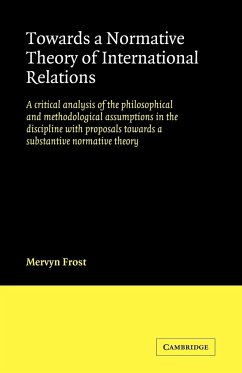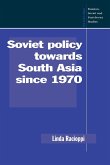Mervyn Frost
Towards a Normative Theory of International Relations
A Critical Analysis of the Philosophical and Methodological Assumptions in the Discipline with
Mervyn Frost
Towards a Normative Theory of International Relations
A Critical Analysis of the Philosophical and Methodological Assumptions in the Discipline with
- Broschiertes Buch
- Merkliste
- Auf die Merkliste
- Bewerten Bewerten
- Teilen
- Produkt teilen
- Produkterinnerung
- Produkterinnerung
An examination of the moral theory of war.
Andere Kunden interessierten sich auch für
![Geoeconomics in International Relations Geoeconomics in International Relations]() Christian PfeifferGeoeconomics in International Relations41,99 €
Christian PfeifferGeoeconomics in International Relations41,99 €![Soviet Policy Towards South Asia Since 1970 Soviet Policy Towards South Asia Since 1970]() Linda RacioppiSoviet Policy Towards South Asia Since 197042,99 €
Linda RacioppiSoviet Policy Towards South Asia Since 197042,99 €![Re-Evaluating Us Foreign Policy Towards Asia Re-Evaluating Us Foreign Policy Towards Asia]() Re-Evaluating Us Foreign Policy Towards Asia36,99 €
Re-Evaluating Us Foreign Policy Towards Asia36,99 €![Ethics in International Relations Ethics in International Relations]() Mervyn FrostEthics in International Relations42,99 €
Mervyn FrostEthics in International Relations42,99 €![Formal Theories in International Relations Formal Theories in International Relations]() Michael NicholsonFormal Theories in International Relations42,99 €
Michael NicholsonFormal Theories in International Relations42,99 €![Peace in Digital International Relations Peace in Digital International Relations]() Oliver P RichmondPeace in Digital International Relations22,99 €
Oliver P RichmondPeace in Digital International Relations22,99 €![Soviet Policy Towards Japan Soviet Policy Towards Japan]() Myles L. C. RobertsonSoviet Policy Towards Japan42,99 €
Myles L. C. RobertsonSoviet Policy Towards Japan42,99 €-
-
-
Produktdetails
- Produktdetails
- Verlag: Cambridge University Press
- Seitenzahl: 252
- Erscheinungstermin: 30. September 2009
- Englisch
- Abmessung: 216mm x 140mm x 15mm
- Gewicht: 360g
- ISBN-13: 9780521125062
- ISBN-10: 0521125065
- Artikelnr.: 27379975
- Herstellerkennzeichnung
- Libri GmbH
- Europaallee 1
- 36244 Bad Hersfeld
- gpsr@libri.de
- Verlag: Cambridge University Press
- Seitenzahl: 252
- Erscheinungstermin: 30. September 2009
- Englisch
- Abmessung: 216mm x 140mm x 15mm
- Gewicht: 360g
- ISBN-13: 9780521125062
- ISBN-10: 0521125065
- Artikelnr.: 27379975
- Herstellerkennzeichnung
- Libri GmbH
- Europaallee 1
- 36244 Bad Hersfeld
- gpsr@libri.de
Acknowledgements
Introduction
Part I: 1. The positivist bias: a philosophical assumption which accounts for the dearth of normative theory in the discipline of international relations
2. Sceptical and realist arguments against normative theory in international relations: a critical appraisal
Part II: 3. Normative issues in international relations: the domain of discourse and the method of argument
4. Towards the construction of a normative theory of international relations
5. Reconciling rights and sovereignty: the constitutive theory of individuality
6. The justification of unconventional violence in international relations: a hard case for normative theory
Conclusion
Bibliography
Index.
Introduction
Part I: 1. The positivist bias: a philosophical assumption which accounts for the dearth of normative theory in the discipline of international relations
2. Sceptical and realist arguments against normative theory in international relations: a critical appraisal
Part II: 3. Normative issues in international relations: the domain of discourse and the method of argument
4. Towards the construction of a normative theory of international relations
5. Reconciling rights and sovereignty: the constitutive theory of individuality
6. The justification of unconventional violence in international relations: a hard case for normative theory
Conclusion
Bibliography
Index.
Acknowledgements
Introduction
Part I: 1. The positivist bias: a philosophical assumption which accounts for the dearth of normative theory in the discipline of international relations
2. Sceptical and realist arguments against normative theory in international relations: a critical appraisal
Part II: 3. Normative issues in international relations: the domain of discourse and the method of argument
4. Towards the construction of a normative theory of international relations
5. Reconciling rights and sovereignty: the constitutive theory of individuality
6. The justification of unconventional violence in international relations: a hard case for normative theory
Conclusion
Bibliography
Index.
Introduction
Part I: 1. The positivist bias: a philosophical assumption which accounts for the dearth of normative theory in the discipline of international relations
2. Sceptical and realist arguments against normative theory in international relations: a critical appraisal
Part II: 3. Normative issues in international relations: the domain of discourse and the method of argument
4. Towards the construction of a normative theory of international relations
5. Reconciling rights and sovereignty: the constitutive theory of individuality
6. The justification of unconventional violence in international relations: a hard case for normative theory
Conclusion
Bibliography
Index.









